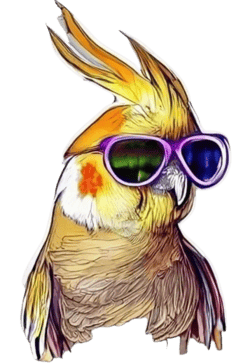Can Cockatiels Eat Cilantro? The Surprising Pet Nutrition Facts That’ll Blow Your Mind
Introduction
A fluffy and cute Cockatiel tap-dancing on your shoulder can bring a smile to anyone’s face. It’s all feathered fun and games until mealtime arrives and confusion sets in. What should one feed this little avian fellow?
Providing a balanced diet to our feathery friends, such as cockatiels, is an important aspect of pet parenting. It’s crucial not only to ensure they get a colorful smorgasbord of nutritious food but also to know what’s harmful to their delicate system. And that’s precisely why today, we are unfurling nutrition facts about a green vegetable: cilantro.
Understanding Cockatiels: Anatomy and Dietary Requirements
Let’s talk about the cockatiel’s digestive system first, it’s like a micro floofy factory, processing food in a unique way. Cockatiels have a crop (a food storing pouch), a gizzard (a muscular organ for food grinding), and other organs that contribute to digestion.
Coming to the diet, cockatiels are essentially granivorous; this means their basic diet includes seeds and grains. However, for a long and healthy life, they require an array of nutrients found in fruits, vegetables, and specially formulated bird food.
Their tiny bodies go all ‘sassy metabolism mode‘ and their lifespan can be drastically altered based on their diet. In simpler terms, what they eat can literally make them sing the “I will survive” song or “Who wants to live forever?”
Peering into the World of Cilantro
Now let’s chat about cilantro, a leafy green hero in many of our dishes with its refreshing taste. Cilantro, also known as coriander, is packed with vitamins A, C, and K, not to mention minerals like potassium and manganese.
This herb plays a versatile role in human diets, gracing everything from salads, soups, to being an essential garnish. With its impressive nutrient profile, it’s no rocket science to wonder if it can deliver goodness to our little-feathered buddies.
The Intersection of Cockatiels and Cilantro: Can Cockatiels Eat Cilantro?

Let’s slice the suspense; yes, Cockatiels can absolutely gorge on cilantro! Phew! The feathers fly in the face of harm as cilantro is not only safe but also packed with many benefits for our feathery friends.
The vitamins in cilantro can contribute to your Cockatiel’s overall well-being, fortifying their immunity and promoting gleaming feathers. The mineral content can aid in building strong bones and maintaining a healthy nervous system.
However, no picnic is complete without ants. Similarly, there’s a potential tiny risk concerning cilantro too. The herb is high in oxalic acid, which can contribute to kidney stones formations if fed in excess.
Practical Tips for Introducing Cilantro to Cockatiel’s Diet
Prepping cilantro for your Cockatiel is as easy as pie. Just wash the herb thoroughly to remove chemicals or dirt, chop it into manageable pieces, and serve it up!
If your Cockatiel is shaking its tail feathers and chowing down on the cilantro, it’s a sign they enjoy it. Equally, if the Cockatiel gives it the cold shoulder and pretends it doesn’t exist, your feathery friend might not be a fan of cilantro.
Instances Where Cilantro May Pose a Challenge for Cockatiels: Can Cockatiels Eat Cilantro?

Certain health conditions, like kidney-related issues, might worsen with cilantro consumption due to its oxalic acid content. Also, look out for any unusual behavior or droppings after cilantro serving, which might indicate intolerance.
If your Cockatiel’s letting you know “Hey, this green stuff? Not my jam!” or showing adverse health signs, it’s important to consult an avian vet.
Exploring Other Dietary Options for Cockatiels
In case cilantro gets kicked off the Cockatiel’s food hit parade, green veggies like peas, broccoli, and spinach can safely take to the stage. Fruits like apple, banana, or peaches can also hit the right notes.
Don’t forget to place a strict embargo on chocolate, avocado, and caffeine, as they are harmful to our feathered symphonists.
Conclusion
To wrap it up, cilantro’s a green light for Cockatiels! It’s loaded with nutrients, but moderation is significant due to the oxalic acid content. Always observe your pet’s reaction when introducing a new food and reach out to a vet if anything seems off-key.
If you’re curious about expanding your cockatiel’s culinary options, you might want to explore our guide on Can Cockatiels Eat Pomegranate?. This resource provides insights into the nutritional benefits and considerations of introducing pomegranate into your cockatiel’s diet, ensuring a well-informed approach to their nutrition.
Frequently Asked Questions (FAQs)
How much cilantro can I feed my Cockatiel in a day?
A tiny portion, about one or two small leaves, should be enough. It’s key to remember: moderation rules the roost.
What other herbs can Cockatiels eat?
A variety of herbs including dill, parsley, and thyme are Cockatiel-friendly.
My Cockatiel refuses to eat cilantro. What should I do?
Fear not! Cockatiels can have strong food preferences. Introduce other safe vegetables or fruits and see which ones tickle their taste buds.
Is it necessary to include vegetables like cilantro in my Cockatiel’s diet?
Although seeds are their mainstay, a diet rich in vegetables like cilantro can supplement different nutrient requirements, promoting a happier and healthier bird life.
Can a Cockatiel eat cilantro stems?
Yes! Cockatiels can eat both the leaf and stem parts of the cilantro plant safely. Just make sure it’s well washed and cut to a manageable size.

About Me
I’m Kamran, a co-founder and content creator at cockatielhq.com. With 8+ years in the world of avian enthusiasts, I’ve gained extensive knowledge in caring for birds. From egg-laying and mating to cohabitation with other birds, dietary needs, nurturing, and breeding, I’m here at cockatielhq.com to share valuable insights for your avian companions.








One Comment